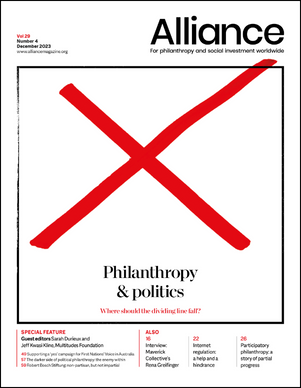Philanthropy can provide the financial support and convening clout to ensure that civil society interests are properly represented in the policy sphere
Civil society interests are important in policy-making processes and are often under-represented because civil society actors lack the financial resources and advocacy capacity that larger foundations can provide. The philanthropic sector is an influential part of civil society. Foundations’ financial and societal capital makes them relevant actors in the public and political spheres. But with power comes the responsibility to use it wisely for the common good.
Philanthropy is not neutral
Philanthropy should remain non-partisan, as the sector is not democratically legitimised. However, foundations should never be impartial or hide behind the pretext of neutrality. Instead, it is important to actively advocate for the values and principles that guide their vision of society. Leveraging their political power and engaging in politics means bringing about systemic change through the policies, laws and regulations that shape our societies.
The foundation has also taken positions on legislation relating to the social issues we work on, such as the proposal for a law against digital violence in Germany.
How we do it
Three years ago, the Robert Bosch Stiftung decided to combine its grantmaking activities in policy and advocacy in the Robert Bosch Academy and Strategic Partnerships division to promote this approach of leveraging political power to effect systemic change.1 We are guided by the belief that policy-making must be evidence-based and inclusive. Our mission is to strengthen the production of evidence, especially in regions of the world that are under-represented in international decision-making processes, and to promote the uptake of evidence by policymakers.
Filling the funding gap
We support the production of evidence by providing institutional funding to think-tanks working on global challenges. We believe it is important for them to have the flexibility to respond quickly to new developments and policy challenges, which is why we focus on institutional funding. We also believe that the perspective of the so-called Global South is under-represented in international decision-making processes, so we fund the Southern Voice think-tank network, which helps think-tanks from the Global South engage with international organisations such as the UN. We also work to strengthen the sector through projects such as the Think-Tank Lab, which builds their capacity to engage with policymakers.
Furthermore, we support the uptake of evidence through capacity-building for policymakers. A growing number of initiatives are being launched to train political leaders, but decision-makers such as Members of Parliament still have little access to training for the job. It is important to equip our political leaders with the skills, networks and knowledge needed to solve global challenges such as climate change or social inequality. In Germany, national leaders often start their careers in local politics, and their understanding is often shaped by this perspective. We therefore offer programmes for decision-makers that aim to strengthen their understanding of other regions of the world and of the links between global trends and national policies. The programmes also focus on promoting cross-party dialogue, as opportunities for such dialogue are rare in an increasingly polarised political environment. One example is the Policy Making in the 21st Century programme, which brings together a cohort of up to 35 national MPs from the German Bundestag for a period of one semester and includes study tours in Asia and Europe as well as executive education at Harvard Kennedy School and Lee Kuan Yew School of Public Policy.
We believe this is a unique portfolio and set of functions within the international philanthropic sector that seeks to strengthen democracy and international understanding.
Our advocacy team supports the transfer of expertise from our programmes and partners. We provide capacity-building for foundation staff to strengthen their ability to act as conveners and advocates and we support grantees by organising relevant events with policy stakeholders. The foundation has also taken positions on legislation relating to the social issues we work on, such as the proposal for a law against digital violence in Germany. However, we do not engage in political lobbying in our own interest, but in the public interest, in accordance with German non-profit law.
Building bridges
Finally, we bring together international decision-makers, experts, and opinion leaders at the Robert Bosch Academy to bridge the gap between evidence generation and uptake. We welcome a select group of distinguished international Richard von Weizsäcker Fellows to Berlin for several months to enrich the policy debates in Berlin with new perspectives that would not otherwise be included. In addition, these fellows leave Berlin with a deeper understanding of German and European debates and networks that they continue to use after their fellowship ends.
And we seek to strengthen the perspectives of marginalised groups within Germany in political debates to ensure that representative democracy is truly representative. Our partnership with the Multitudes Foundation is an example of this work. They are working to develop an ecosystem of initiatives that train changemakers from diverse backgrounds to enter the political sphere and gain political power.
We believe this is a unique portfolio and set of functions within the international philanthropic sector that seeks to strengthen democracy and international understanding. However, we believe the need is great enough for more actors to follow our example, create synergies, help us learn from each other, and ensure that the voice of civil society is heard in politics.
Henry Alt-Haaker is senior vice president, Robert Bosch Foundation. Email henry.alt-haaker@bosch-stiftung.de T @HenryAltHaaker
Susanne Zels is programme director, Robert Bosch Foundation. Email susanne.zels@bosch-stiftung.de T @SusanneZels




Comments (0)
Nous sommes une organisation non gouvernementale de la société civile dénommée Actions Communautaires pour le Développement de la Femme (ACODEFEM) notre siège social à Kinshasa 🇨🇩. Nous sommes disposés à travailler avec l’Alliance